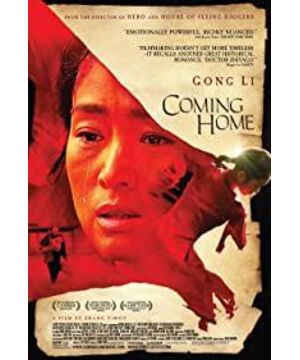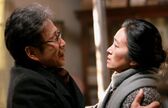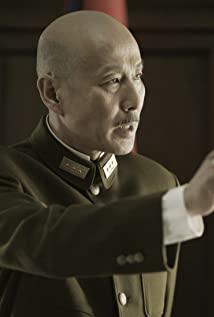This story, which can be written on a piece of paper, is made into a movie and is attractive to watch. It shows that the director is still capable.
After reading it, some people may ask: Can Lu Yanzhi, who has finished the labor reform, really love Feng Wanyu, who is already a little mentally ill, so affectionately? While asking this question, the B-side of the film began --- this is the director's intention.
The film does not involve suffering at all, nor does it involve happiness at all. What he shoots is everyday. Bottles and cans, washing vegetables and cooking, drinking tea and chatting.
But the grass snake gray line always hints at your unphotographed stories, like "Dream of Red Mansions," on the surface it is the life of a big family, but after reading it carefully, the literal behind it is more thrilling than a horror novel. Be horrible.
The most concentrated is undoubtedly reading letters and looking at photos, as well as playing the piano. From these photos, letters, piano, you can outline their love, their lives, how happy and sweet they were once. After these fillers are completed, you can answer a question, why they can still be so reciprocal after they haven't seen each other in 20 years-this is love, and the group of buns who initiated the Cultural Revolution led by Mao Zedong didn't understand this. I have never tasted love in my life.
In this movie, Zhang Yimou once again demonstrated his masterful demeanor, restrained lyricism, lifted weights lightly, and talked about the suffering and tears as plainly as possible. This kind of restraint and depression made people sad. When I saw Lu Yanshi find the old When his classmate (Chen Xiaoyi) borrowed the photo, the female classmate told him that David Yu in the photo had committed suicide. Lu Yanshi listened in silence. Sadly. Didn't say anything.
Why did he commit suicide? The weight of this sentence is heavy. The post-ninety post-ninety generation will not understand it, and the post-eighties post-80s generation is not much better. The biggest characteristic of the Chinese is to forget and forget the history. When these old people die, this history may really be lost.
David Yu, we can imagine from this name that this is an overseas student who has returned from studying abroad to build the motherland. Like Lu Yanzhi, the photo is a photo of them together. People like David Yu and Lu Yanzhi are not like Guo Moruo. People are like running dogs, studying abroad and shooting horses. They are definitely not convinced, despise Mao’s regime, despise workers, peasants and soldiers, and face the absurd world, full of ridicule and protest, and then they were forced to reform through labor, and it has been ten years. It is conceivable that the "guilt" is so serious that Qian Zhongshu is only three to five. Cadre School of the Year. Lu Yanzhi was a reform-through-labor, and he was treated as a repeat offender when arrested--but he was just an intellectual with glasses and a weak scholar.
In that extraordinary period (judging from the film, it should be 66-76 ten years, he has all caught up, maybe the land reform before the Cultural Revolution, his doom had already begun when the rebellion was suppressed) people who survived depended on faith, I believe that my age and body can last until the hair is dead, the exercise is over, and everything will return to normal. In addition to faith, the most important thing is family affection and love. After the exercise is over, you can get your life back on track before it is worth keeping on. If your lover, friend, wife, children, and yourself draw a clear line to protect yourself (the kind of real break, the kind of disaster that comes and fly each other), the hurt is too deep, Hard-hearted people may feel that life is meaningless, and when they are humiliated in every possible way and a group of ghosts are in power, they relax a little and commit suicide. That's how Lao She chose.
From reading the letter, it can be seen that Lu Yanshi is obviously a soft character, open-minded and optimistic, adheres to principles, and can't get through with principles, but will not get up with himself. In addition to these character factors, there is also the farewell at the train station. He did not despair because he knew his wife was still waiting for him. His wife believed him and understood him to support him. Therefore, he had a positive mentality during the labor reform and wrote to encourage himself to live. He survived.
The best two scenes in the whole play, one is: Lu Yanzhi goes home for the first time. No matter what Chen Daoming played, it was very real, that kind of joy, passionate yearning, parting bitterness that had not been seen in ten years, and depressed tears, all of a sudden appeared in an ordinary scene. Gong Li didn't need special expression in this scene, she no longer remembered Lu Yanzhi's appearance. The other scene is Lu Yanshi playing the piano. In this scene, tears that have been suppressed for twenty years finally gush out. Up to this point, even if Feng Wanyu couldn't recognize him until his death, it didn't matter.
I'm not afraid to offend people. This movie was not made for young people.
If you really understand the vicissitudes of this, the subtle details here, it will take several years.
Some people are dissatisfied with the self-censorship of the movie "Return," which cuts out or does not shoot the more sensitive parts at all, but dancing with fetters is not necessarily a kind of restraint, and the conditional composition can be more talented. I am not advocating film censorship, but the way Zhang Yimou has found to express suffering and catastrophe, this angle, and this narrative is indeed a master style. Speaking of censorship, the scene where the quotation book is held in the film and sing the quotation song is really a very large scale in China.
I hope this shadow can trigger more thinking, and hope that those who wish to return to the Mao era will not forget the past. A happy family that was originally happy was destroyed in this way, and the tragedy that broke this beauty was a tragedy that blossomed out of people's firm faith and loyal love.
View more about Coming Home reviews











